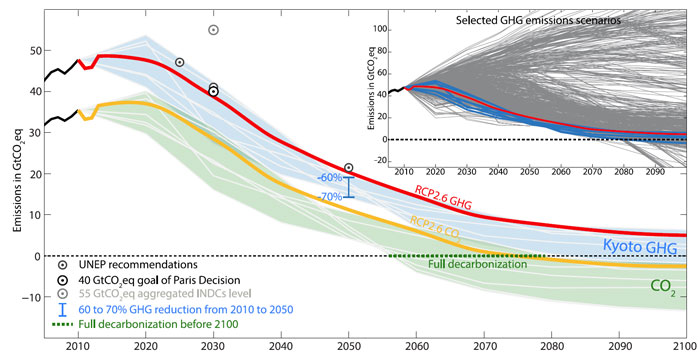National contributions for decarbonizing the world economy in line with the G7 agreement
Authors: Yann Robiou du Pont , M Louise Jeffery , Johannes Gütschow , Peter Christoff and Malte Meinshausen
Citation: National contributions for decarbonizing the world economy in line with the G7 agreement
Yann Robiou du Pont, M Louise Jeffery, Johannes Gütschow, Peter Christoff and Malte Meinshausen
2016 Environ. Res. Lett. 11 054005 doi:10.1088/1748-9326/11/5/054005
Direct link: http://iopscience.iop.org/article/10.1088/1748-9326/11/5/054005?fromSearchPage=true
Abstract:
In June 2015, the G7 agreed to two global mitigation goals: ‘a decarbonization of the global economy over the course of this century’ and ‘the upper end of the latest Intergovernmental Panel on Climate Change (IPCC)recommendation of 40%–70% reductions by 2050 compared to 2010’. These IPCC recommendations aim to preserve a likely (>66%) chance of limiting global warming to 2 °C but are not necessarily consistent with the stronger ambition of the subsequent Paris Agreement of ‘holding the increase in the global average temperature to well below 2 °C above pre-industrial levels and to pursue efforts to limit the temperature increase to 1.5 °C above pre-industrial levels’. The G7 did not specify global or national emissions scenarios consistent with its own agreement. Here we identify global cost-optimal emissions scenarios from Integrated Assessment Models that match the G7 agreement. These scenarios have global 2030 emissions targets of 11%–43% below 2010, global net negative CO2 emissions starting between 2056 and 2080, and some exhibit net negative greenhouse gas emissions from 2080 onwards. We allocate emissions from these global scenarios to countries according to five equity approaches representative of the five equity categories presented in the Fifth Assessment Report of the IPCC(IPCCAR5): ‘capability’, ‘equality’, ‘responsibility-capability-need’, ‘equal cumulative per capita’ and ‘staged approaches’. Our results show that G7 members’Intended Nationally Determined Contribution (INDCs) mitigation targets are in line with a grandfathering approach but lack ambition to meet various visions of climate justice. The INDCs of China and Russia fall short of meeting the requirements of any allocation approach. Depending on how their INDCs are evaluated, the INDCs of India and Brazil can match some equity approaches evaluated in this study.


